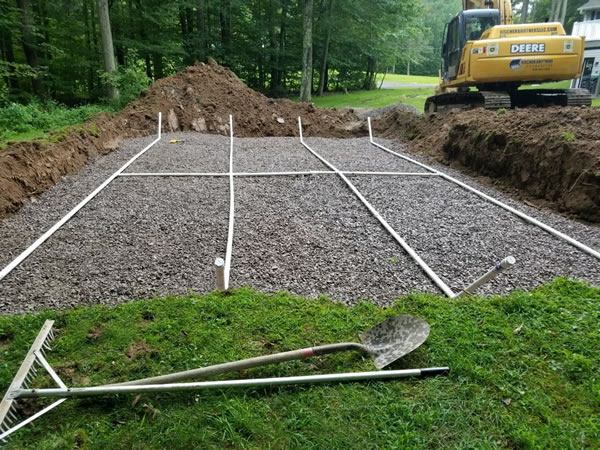
03
The septic system relies heavily on the drain field (also known as a leach field or absorption field) to treat and disperse wastewater after it leaves the septic tank. Understanding the science behind drain fields can help homeowners appreciate their function and importance, and ensure they maintain their septic systems properly.
The journey of wastewater begins in the septic tank. When wastewater from the household enters the septic tank, it separates into three layers: solids (sludge) settle at the bottom, oils and grease (scum) float to the top, and the liquid effluent remains in the middle. The septic tank’s primary role is to break down organic matter and separate solids from liquids. Regular septic tank pumping by Charlotte Septic Pros helps remove the accumulated sludge and scum, preventing them from overflowing into the drain field.
After partial treatment in the septic tank, the effluent flows out into the drain field. This effluent contains dissolved organic matter, nutrients, and pathogens that need further treatment before safely re-entering the groundwater.
The drain field consists of a series of perforated pipes or chambers buried in trenches filled with gravel or sand. As the effluent flows through these pipes, it percolates into the surrounding soil. The soil acts as a natural filter, where physical, chemical, and biological processes further treat the wastewater.
Regular septic tank pumping is crucial to prevent solids from building up and flowing into the drain field. Over time, the sludge and scum layers can accumulate, reducing the tank's efficiency and potentially clogging the drain field. Most experts recommend septic tank pumping every 3 to 5 years, but this can vary based on tank size and household usage.
Along with pumping, periodic septic tank cleaning is necessary to ensure the tank and its components remain free of buildup and function correctly. Cleaning helps remove residue that might not be eliminated through pumping alone.
Septic tank repair is essential for addressing any structural issues, such as cracks or leaks, that could lead to system failure. A damaged tank can allow untreated wastewater to seep into the drain field, overwhelming it and potentially causing contamination.
Proper septic tank installation is fundamental for the long-term success of the system. An experienced septic company like Charlotte Septic Pros will ensure the tank is appropriately sized, located, and connected to the drain field, taking into account soil type, landscape, and household needs.
The science behind drain fields involves a complex interplay of physical, chemical, and biological processes that treat and disperse wastewater safely. Understanding these processes highlights the importance of regular septic tank maintenance, including septic tank pumping, cleaning, and repair. Partnering with Charlotte Septic Pros for these services can ensure your septic system operates efficiently, protecting both your property and the environment.

22
Can Bacteria Additives Eliminate the Need for Pumping? If you own a home with a septic system, you’ve probably seen…
Read more
12
A single slow drain in your home can feel like a minor inconvenience. Maybe the sink takes a little longer…
Read more
05
Are Slow Drains a Septic Issue or Just a Clog? Slow drains are one of those household problems that start…
Read more
02
What Septic Service Techs See That Homeowners Miss Most homeowners only think about their septic system when something goes wrong.…
Read more
21
Simple Habits That Protect Your Septic System A well-functioning septic system does its job quietly, but the moment something goes…
Read more
14
Pump Now or Pay Later: The Real Cost of Skipping Maintenance A properly functioning septic system is easy to forget…
Read more
11
Why Your Septic System Always Acts Up at the Worst Time Homeowners often feel that septic problems strike at the…
Read more
04
Early Warning Signs Your Septic Tank Needs Pumping For homeowners who rely on a septic system, routine maintenance is not…
Read more
29
Why Does My Septic System Smell Fine One Day and Terrible the Next? If you own a home with a…
Read more
19
Is Your Septic System Overdue? Simple Home Checks You Can Do Today For many homeowners, the septic system is a…
Read more